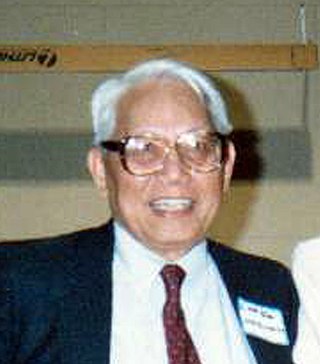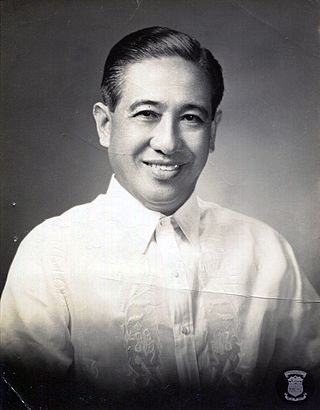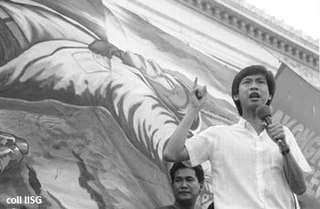
Claro Mayo Recto Jr. was a Filipino politician, statesman, lawyer, jurist, author, writer, columnist, and poet. Perhaps best known as the president of the 1934 Constitutional Convention and the Father of the 1935 Philippine Constitution, he is remembered as a fierce opponent of U.S. neocolonialism in Asia and for his staunch nationalist leadership throughout his career.

Jovito Reyes Salonga, KGCR also called "Ka Jovy," was a Filipino politician and lawyer, as well as a leading opposition leader during the regime of Ferdinand Marcos from the declaration of martial law in 1972 until the People Power Revolution in 1986, which removed Marcos from power. Salonga was the 14th president of the Senate of the Philippines, serving from 1987 to 1992.
Francisco "Franz" Arcellana was a Filipino writer, poet, essayist, critic, journalist and teacher.

Néstor Vicente Madali González was a Filipino novelist, short story writer, essayist and, poet. Conferred as the National Artist of the Philippines for Literature in 1997.

Lorenzo Martinez "Ka Tanny" Tañada Sr. was a Filipino statesman, lawyer, human and civil rights defender, and national athlete. He is often referred to as the "Grand Old Man of Philippine Politics."

Leandro "Lean" Legara Alejandro was a student leader and left-wing nationalist political activist in the Philippines.

Francisco "Soc" Aldana Rodrigo was a Filipino playwright, lawyer, broadcaster, and a Senator of the Philippines from 1955 to 1967.

Joaquin "Chino" Pardo Roces was a Filipino businessman and newspaper publisher. He was best known for being the founder of the Associated Broadcasting Corporation and a former owner of The Manila Times, as well as his staunch opposition of the administration of Ferdinand Marcos.

Maria Lorena Morelos Barros was a Filipino activist. She founded the Malayang Kilusan ng Bagong Kababaihan or MAKIBAKA, a militant women's organization shortly before the Martial Law. When Martial Law was declared, she went underground, was later captured and was a top political prisoner. She escaped to the countryside as a guerrilla fighter and was killed during a military ambush at 28 years old.

The Free Legal Assistance Group (FLAG) is a nationwide organization of human rights lawyers in the Philippines. It was founded in 1974 by Sen. Jose W. Diokno, Lorenzo Tañada, J.B.L. Reyes, and Joker Arroyo during the martial law era under former President Ferdinand Marcos. It is the first and largest group of human rights lawyers established in the nation. They work on countering varied abuses against human rights and civil liberties. Its current chairman since 2003 is human rights attorney Chel Diokno, the founding dean of the De La Salle University Tañada-Diokno School of Law.
The Task Force Detainees of the Philippines (TFDP) is a non-profit, national human rights organization based in Manila, Philippines. It documents human rights violations, assists victims and their families, organizes missions, conducts human rights education work, campaigns against torture, and promotes advocacy for Human Rights Defenders and Environmental movement.

The Bantayog ng mga Bayani, sometimes simply referred to as the Bantayog, is a monument, museum, and historical research center in Quezon City, Philippines, which honors the martyrs and heroes of the struggle against the dictatorship of the 10th Filipino president Ferdinand Marcos.
Student activism in the Philippines from 1965 to 1972 played a key role in the events which led to Ferdinand Marcos' declaration of Martial Law in 1972, and the Marcos regime's eventual downfall during the events of the People Power Revolution of 1986.
The Bulacan Martyrs of 1982 was a group of young activists who worked together to oppose the Ferdinand Marcos dictatorship and restore democracy in the Philippines. They were meeting at a farmer's residence on June 21, 1982, when the house was raided by 30 armed soldiers from the 175th Philippine Constabulary (PC) Company. They were arrested and were found dead the following day in another town 20 kilometers away.

Lourdes "Chit" Panganiban Estella-Simbulan was a Filipino journalist and professor, known for her critical writings on government repression, abuse, corruption and human rights violations.
Religious sector opposition against the dictatorship of President Ferdinand Marcos included leaders and workers belonging to different beliefs and denominations.

During the presidency of Ferdinand Marcos, Filipino workers in the labor industry experienced the effects of government corruption, crony capitalism, and cheap labor for foreign transnational industries, One of the objectives of Martial Law was to cheapen labor costs, in order to attract transnational corporations to export labor to the Philippines. Marcos signed many presidential decrees beneficial only to his associates, while allowing for the forced relocation of indigenous peoples, decreasing workers' wages, and murders of labor activists. Minimum wage was a fixed PHP8.00 per day. Many workers were unemployed or underemployed. It was also during the Marcos presidency when the practice of contractualization began, enabling managements to avoid giving regular, permanent status to employees after six months of work. Strikes were banned and the government controlled trade unions, leaving workers without effective protection against employers who had unfair labor practices and regulations.

Manuel Candelaria Bautista was a Filipino student leader, campus journalist, and activist best known for his contributions as a student leader at the University of the Philippines Los Baños during the Martial Law dictatorship of Ferdinand Marcos.

Armando "Mandrake" Ducusin Palabay was a Filipino student leader and activist from San Fernando, La Union. He is best known for his work in organizing anti-Marcos campaigns during the first quarter storm and the early days of Martial law under Ferdinand Marcos. He was killed for the anti-Marcos cause while doing community work among the indigenous Tingguian people of Sallapadan, Abra, in 1974, and was honored in 2001 by having his name inscribed on the Wall of the Remembrance at the Philippines' Bantayog ng mga Bayani, which honors the martyrs and heroes who fought the dictatorship.
The September 1984 Welcome Rotonda protest dispersal was a landmark incident which happened on September 27, 1984, near the end of the administration of Ferdinand Marcos, in which pro-Marcos forces hosed down and fired tear gas on several thousand peaceful protesters gathered at Welcome Rotonda, a roundabout on the border between the City of Manila and Quezon City. They also fired into the crowd. Student leader Fidel Nemenzo was shot in the back, eventually recovering from the M-16 bullet that hit his liver, diaphragm and lungs.













